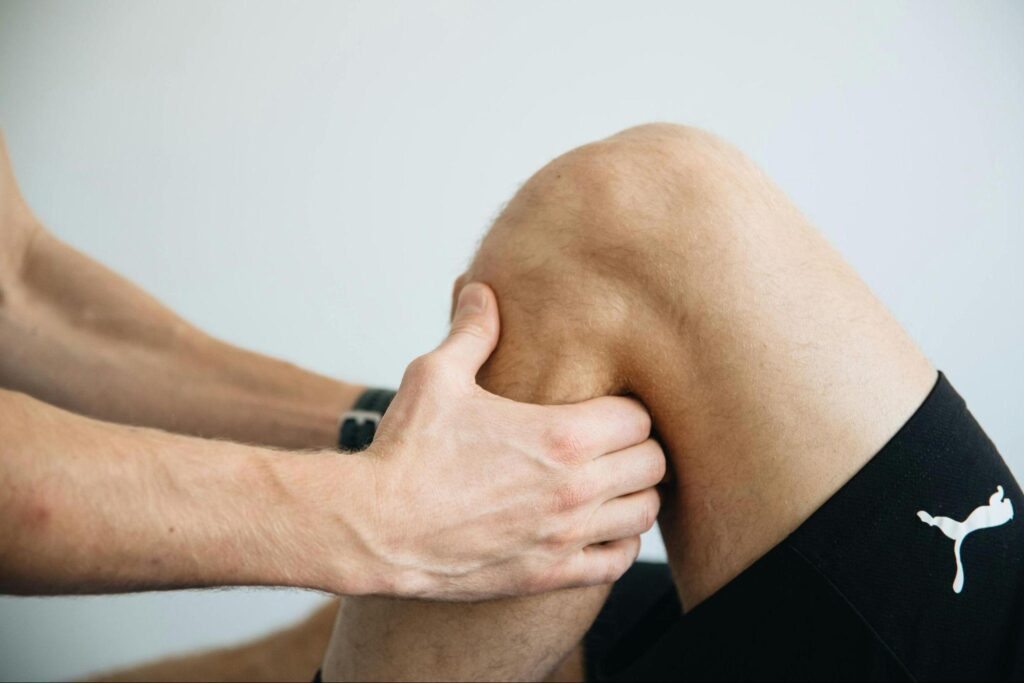
Knee pain can have a profound impact on daily life, making everyday activities—like walking, running, or even taking the stairs—challenging and uncomfortable. In Australia, where outdoor activities and an active lifestyle are valued, knee pain can seriously hinder one’s ability to stay active and healthy.
When traditional pain relievers fail to provide relief, many Australians are turning to alternative treatments like CBD and other forms of medical cannabis. In this article, we explore how CBD may help alleviate knee pain, the science behind it, and ways to integrate it into a pain management routine.
Understanding Knee Pain
Knee pain is one of the most common musculoskeletal complaints, second only to back pain. This condition affects people of all ages in Australia, impacting their ability to work, play sports, and enjoy daily activities.
Who Is at Risk of Knee Pain?
Several factors contribute to knee pain, and understanding these can help manage or reduce discomfort:
- Age: Knee pain is common among older Australians due to wear and tear on joints.
- Weight: Extra body weight increases the load on knee joints, leading to faster deterioration of cartilage.
- Physical Activity: High-impact sports like football, running, and tennis can strain knees more than low-impact activities such as swimming or cycling.
- Injuries: Previous knee injuries, including ligament tears, meniscus tears, and fractures, can make the knee more vulnerable.
- Inflammatory Conditions: Arthritis, gout, and other inflammatory conditions are leading causes of chronic knee pain, especially in those over 45.
Common Symptoms of Knee Pain
Knee pain manifests differently depending on the cause but often includes symptoms like stiffness, swelling, and a feeling of instability in the knee. Inflammatory conditions may also cause redness and warmth around the knee area. These symptoms can either persist throughout the day or worsen after physical activity, impacting overall mobility and comfort.
How Can CBD Help with Knee Pain?
CBD (cannabidiol) is a compound derived from the cannabis plant, believed to have pain-relieving and anti-inflammatory properties. In Australia, CBD is gaining attention for its potential to relieve pain without the intoxicating effects associated with THC.
Pain Relief and Inflammation Reduction
Studies suggest that CBD interacts with the body’s endocannabinoid system (ECS), which regulates various functions, including pain and inflammation. By influencing receptors within the ECS, CBD may reduce inflammation, a major factor in conditions like arthritis, which often contributes to chronic knee pain.
CBD is thought to be effective in relieving pain because it modulates the brain’s response to pain signals, potentially offering relief without traditional pain medications. For Australians with knee pain due to arthritis, CBD may reduce stiffness and inflammation, improving joint mobility.
Types of CBD Products for Knee Pain
In Australia, CBD products are available in various forms, each with different administration methods. Here are some popular options:
- Topical Creams and Balms: Applied directly to the skin, CBD creams allow targeted relief on the knee, reducing pain and inflammation locally.
- Oral Tinctures: CBD oils are administered under the tongue, allowing quick absorption into the bloodstream. This can offer more systemic pain relief, especially useful for those with multiple pain sites.
- Edibles and Gummies: These provide a longer-lasting effect, though onset may be slower. Gummies are a discreet and convenient option for pain management.
- Inhaled Products: Vaping or inhaling CBD offers the fastest onset, though it may not be suitable for everyone. Australians considering vaping should consult a doctor about potential respiratory effects.
Prescription CBD for Knee Pain
In Australia, some forms of CBD require a prescription, especially those containing THC or other cannabinoids. Patients with severe chronic pain may be prescribed a CBD-THC combination for enhanced pain relief. A prescription can be obtained through a licensed medical cannabis clinic, which can also provide guidance on product types and dosages.
Choosing the Right CBD Product for You
When considering CBD for knee pain, Australians should take a few factors into account to ensure a safe and effective experience:
- Consider Current Medications: Before starting CBD, consult your doctor to avoid potential interactions with other medications, especially blood thinners and painkillers.
- Go Slow: For those new to CBD, starting with a low dose is recommended. Gradually increase it to gauge its effects and avoid potential side effects.
- Type of Pain: If your knee pain is localized, a topical CBD cream might be most effective. For more widespread pain, oral or inhaled forms might be more suitable.
- Legal Considerations: Only products containing CBD are legally available without THC, though certain blends can be prescribed. Make sure you’re purchasing from licensed providers in Australia to ensure quality and compliance.
The Science Behind CBD’s Effects on Knee Pain
The endocannabinoid system (ECS) plays a central role in maintaining balance in the body, affecting mood, sleep, appetite, and pain perception. CBD is thought to interact with CB1 and CB2 receptors within the ECS:
- CB1 Receptors: These receptors influence the brain and central nervous system, impacting pain perception. While CBD doesn’t directly bind to CB1, it may influence these receptors indirectly, leading to pain reduction.
- CB2 Receptors: Primarily found in the immune system, CB2 receptors regulate inflammation. CBD may reduce inflammation by affecting these receptors, providing relief for conditions like arthritis.
Potential Side Effects and Safety
While CBD is generally well-tolerated, it may cause mild side effects, such as fatigue, dry mouth, or dizziness. Australians trying CBD for the first time should start with a low dose and monitor for any adverse reactions. Additionally, consult with a healthcare provider, particularly if you have pre-existing conditions or take other medications.
Is CBD Legal in Australia?
CBD is legal in Australia but remains regulated. Products containing CBD only are available over the counter, while those with THC require a prescription. Licensed clinics and online platforms offer consultations for patients interested in CBD for pain relief.
How to Incorporate CBD into a Knee Pain Management Routine
Using CBD effectively requires a holistic approach. Here’s a simple plan:
- Combine with Physical Therapy: Light exercises like swimming or walking can improve knee strength and flexibility, and CBD can relieve post-exercise soreness.
- Focus on Diet: An anti-inflammatory diet can reduce stress on the joints, and CBD may support this by managing inflammation.
- Address Mental Health: Knee pain can affect mood and mental well-being. CBD is known for its calming effects, which may help manage stress related to chronic pain.
Final Thoughts
Knee pain is a common, often debilitating issue that affects many Australians. While more research is needed, CBD offers a promising option for pain relief, particularly when combined with a balanced lifestyle. Before introducing CBD to your routine, consult a medical professional to ensure it’s safe and suitable for your needs. If you’re interested in exploring CBD or other cannabis options, book an appointment with a certified clinic in Australia for expert advice.
Whether you’re considering a cream, tincture, or other form of CBD, understanding its benefits and limitations is crucial to finding the right balance in your pain management plan.







